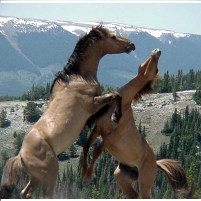Judge Blasts Bureau of Land Management for Using Email Error as Excuse to Ignore Evidence in Wild Horse Killing Case
Monday, May 14, 2012

Although big firm “corporate lawyers” have a well-deserved reputation for sharp dealing and exploiting technicalities, attorneys working for the government are equally willing to hide behind picayune loopholes when it benefits their client. A case in point arose last week in the latest battle in an ongoing war between horse lovers and the Bureau of Land Management (BLM) over its plans to reduce the numbers of wild horses roaming the West.
For years, the bureau has contended that exploding numbers of non-native wild horses are a threat to native plants, animals, and habitat. Thus the BLM occasionally rounds up wild horses, and currently has more than 45,000 in long-term corrals; others are slaughtered and sold as meat to foreign countries.
Seeking a less lethal solution to the wild horse problem, the BLM proposed a program for Wyoming in early 2011 to round up, castrate, and return a large number of geldings, saving equine lives while reducing population growth. The American Wild Horse Preservation Campaign (AWHPC) and others sued the bureau to stop the program, supporting their legal filings with sworn affidavits from four experts on horses criticizing the environmental, behavioral, and physiological effects of the plan. When the BLM decided on its own to cancel the plan, however, the lawsuit was dismissed in August 2011.
Little more than a month later, on September 28, the BLM resurrected its stallion castration program, this time proposing a pilot program for a large herd in central Nevada. When AWHPC filed its comments objecting to the plan on the due date of October 28, it relied on the same four affidavits submitted to the bureau months before, but failed to actually attach them to the comments.
Apprised of the situation, the AWHPC tried to correct its error by emailing the attachments, but it is unclear whether the emails arrived at BLM. After the bureau announced its decision in late November to proceed, preservation group filed a lawsuit again relying on the four affidavits, and asking the judge to issue a preliminary order against the BLM.
Asking the judge to dismiss the motion, the bureau argued that because the four affidavits were not submitted on time, they could not be considered as part of the official “record” of the agency’s decision making, and so should not considered by the judge. Although the law is clear that documents submitted late to an agency generally may not be considered by a judge, federal district judge Beryl Howell would not allow the BLM attorneys to use their ostrich defense as an excuse to ignore the information submitted to it in good faith.
Emphasizing that portions of the affidavits were included in the comments via quotations, and that the BLM had possession of the very same declarations from a case only months before, Judge Howell ruled that the bureau “may not simply remain studiously ignorant of material scientific evidence,” because of a quickly corrected good faith error in transmission.
-Matt Bewig
To Learn More:
Faulty Email No Excuse Not to Use Scientific Data (by Travis Sanford, Courthouse New Service)
AWHPC v. Salazar, Memorandum Opinion and Order (by Hon. Beryl A. Howell) (pdf)
Bureau of Land Management Refuses Public Photographing of Wild Horse Roundups (by Noel Brinkerhoff and David Wallechinsky, AllGov)
Federal Court Refuses to Oppose Wild Horse Roundup…Because It Already Happened
- Top Stories
- Unusual News
- Where is the Money Going?
- Controversies
- U.S. and the World
- Appointments and Resignations
- Latest News
- Trump Renames National Football League National Trump League
- Trump to Stop Deportations If…
- Trump Denounces World Series
- What If China Invaded the United States?
- Donald Trump Has a Mental Health Problem and It Has a Name






Comments